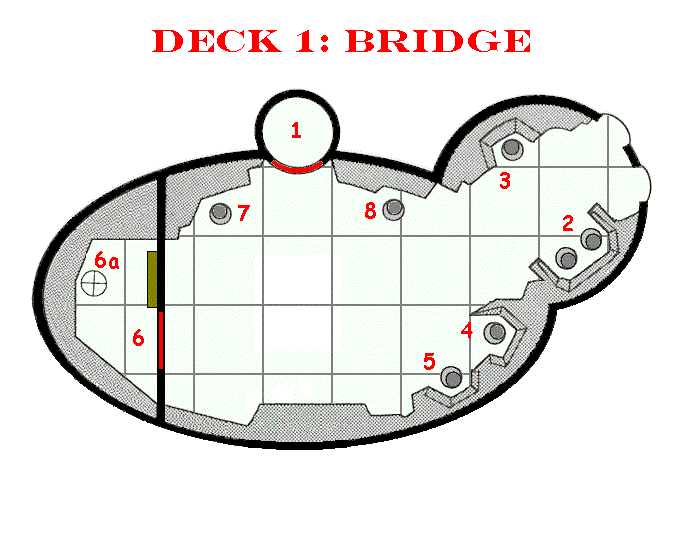Wicked Wench deck 1: Bridge

1> Central Elevator: the central elevator accesses all decks. It will take d10-3 turns to call the elevator (zero or less means the car is already on that deck), depending on what deck it was on last. Command officers (captain, pilots, engineers, astrogators, and gunnery officers) can halve that time by overriding the elevator with their ID (command officers have priority so the elevator won't stop at other decks while called upon). The elevator will sound an alarm tone when sensing a vaccuum outside, two buttons on opposite sides of the door must be pressed to open the door into a vaccuum (the elevator will depressurize and then open).
2> Pilot Station ***COMPUTER ACCESS*** command chairs for pilot and co-pilot, all piloting functions can be performed from either position. Also access to the ship's intercom, radar, and skin sensors.
3> Chief Engineer station ***COMPUTER ACCESS*** An engineer can direct and perform the Damage Control and Stress Analysis functions here.
4> Astrogator Station ***COMPUTER ACCESS*** An astrogator performs any/all astrogation functions here. A second astrogator can assist from the Computer Station nearby.
5> Computer Operator station ***COMPUTER ACCESS*** This is the primary control board for accessing the mainframe computer, all programs can be accessed from here. The Computer Operator can also assist the astrogator assuming he/she possesses the astrogation skills.
6> Mainframe Computer and Storage: any station marked ***COMPUTER ACCESS*** can tap into the mighty krays of the mainframe (access can be attained on the mainframe itself as well). 6a is a computer maintenance shaft access. Individual access stations can only access programs related to that station, for example the pilot station has access to all the piloting functions along with any other supporting systems, such as the ICM launcher and info storage and such, but not the engineering or astrogation programs. The lockers on the port bulkhead can store small arms, defensive suits, and other personal items.
7> Detection Officer: The officer positioned here has access to the radar and energy sensor, along with the skin sensors on the hull. This position can be eliminated for a skeleton crew, with these features manipulated by the pilot(s). The main radar is located on the other side of the hull from this station, the energy sensor is mounted further forward.
8> Communications Officer: the crew member positioned here operates the ship's subspace radio, videocom, and intercom. This position can be eliminated for a smaller crew, with these features manipulated by the pilot(s)